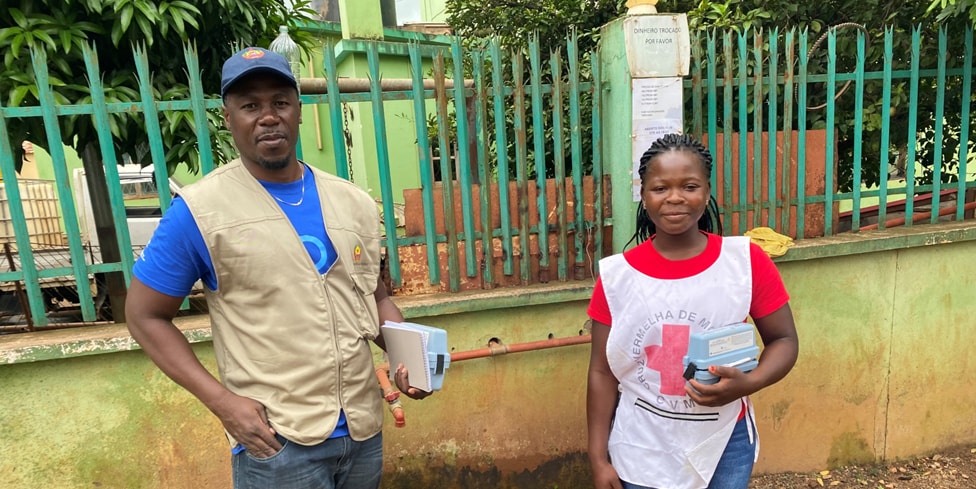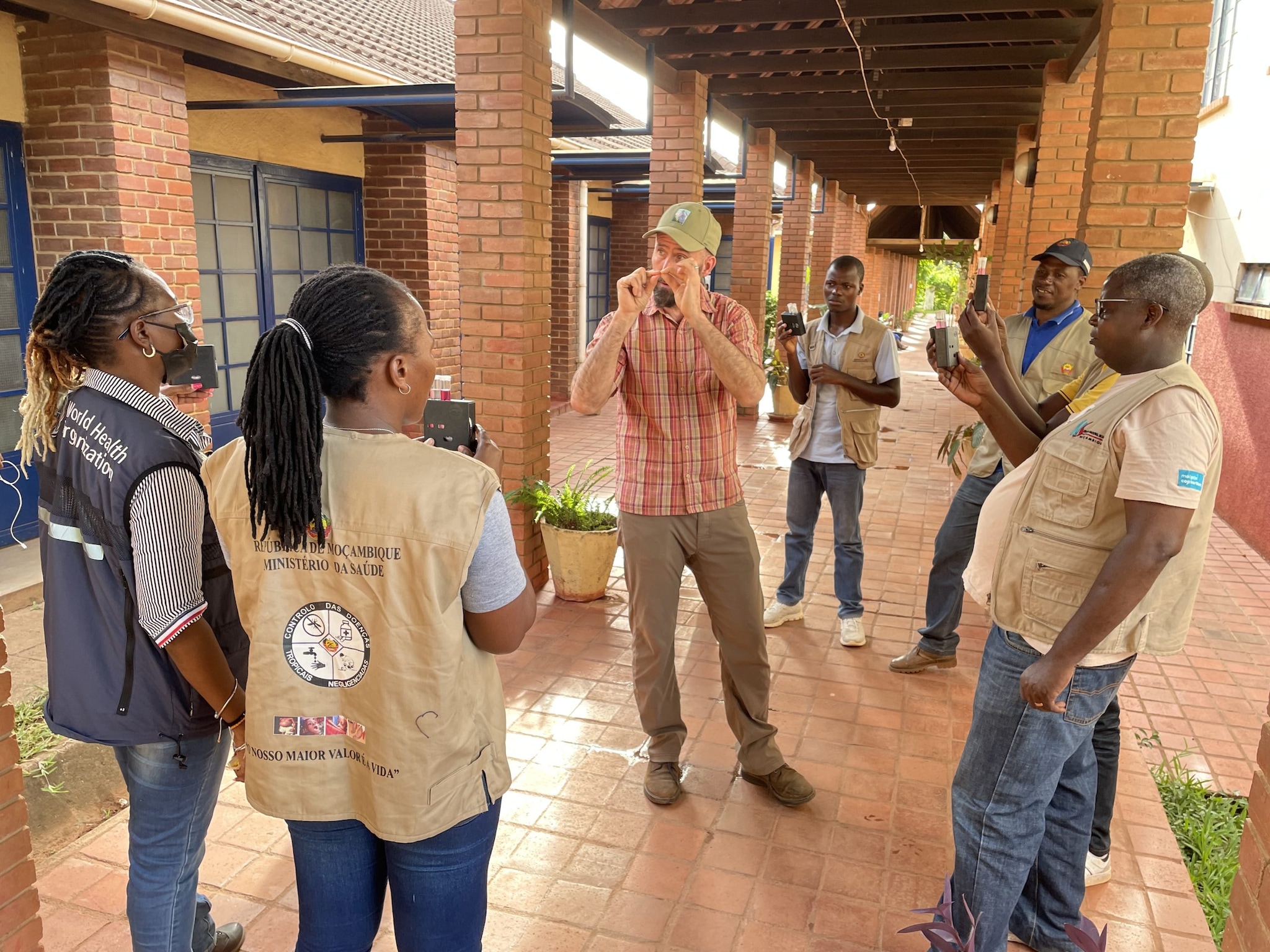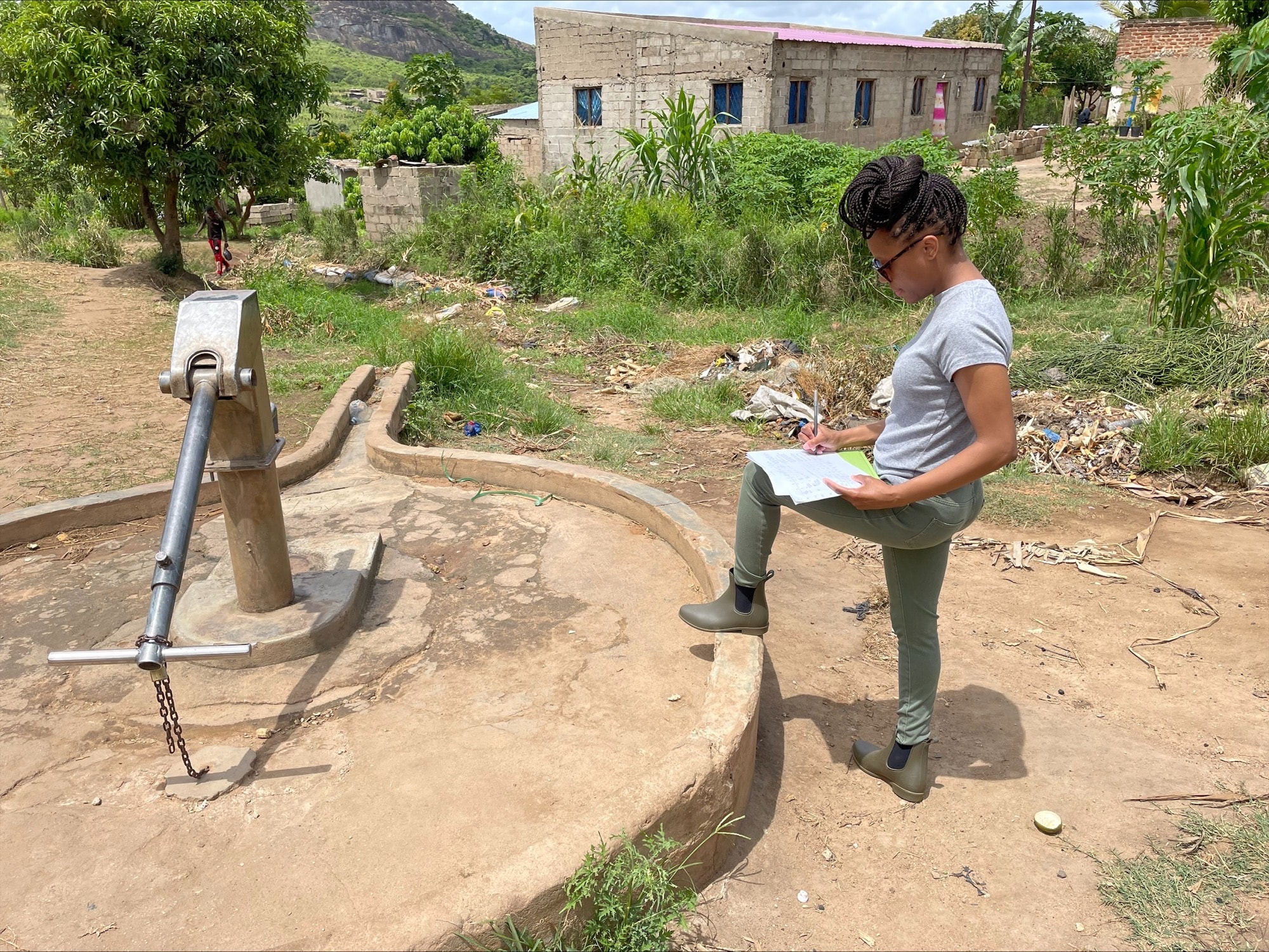CDC Enhances Mozambique’s Capacity for Cholera Response
October 23, 2023

Staff members from the Provincial Directorate of Health and Red Cross who measured free residual chlorine levels in the water distribution system in affected communities. Photo: Dr. Ryan Schweitzer, CDC/GHC/DGHP
Cholera is a preventable diarrheal disease and estimated to cause 2.9 million infections and 95,000 deaths annually worldwide. This year, cholera outbreaks have occurred in at least 24 countries, including Mozambique. While cholera is not new to Mozambique, the devastating impact of heavy rains and Cyclone Freddy has intensified this year’s outbreak and hindered response efforts. Mozambique is no stranger to cyclones, tropical storms, flooding, and subsequent disease outbreaks which occur yearly.
Implementing One CDC Approach
In response to the cholera outbreak in late 2022 to mid-year of 2023, CDC field and headquarters staff joined forces to provide crucial support to the Government of Mozambique response. The goal was to strengthen cholera response coordination, improve technical aspects of the response, and enhance the capacity of in-country staff and partners.
As of July 2023, Mozambique recorded 33,388 cases of cholera, including 141 deaths. The close proximity to Malawi, a country struggling with its deadliest outbreak of cholera in history, heightened the risk of disease transmission across borders. Additionally, inadequate access to safe drinking water and sanitation is an ongoing challenge that further contributed to the number of cholera cases in Mozambique.
The CDC Mozambique Country Team (MozCT) played a pivotal role in coordinating a cohesive “One CDC” response across several CDC Centers. This included deploying teams from both CDC Headquarters (CDC HQ) and CDC Mozambique field staff. CDC in-country subject matter experts provided essential technical assistance and a deep understanding of the local context of the outbreak which was invaluable to the response.
Engaging CDC Partners and Leveraging Resources

CDC Public Health Engineer training health authorities in the measurement of free residual chlorine levels in Chimoio City’s water distribution system. Photo: Dr. Frederica Lamar, CDC/GHC/DGHP
Leveraging well-established partners in affected provinces, including those supported through the United States President’s Emergency Plan for AIDS Relief (PEPFAR), allowed CDC to swiftly meet immediate needs. While cholera prevention and control remain a core focus for CDC, PEPFAR was committed to ensuring the continuity of HIV services and collective efforts focused on continuing and re-establishing all health-related services. CDC collaborated closely with CDC PEPFAR partner, Friends in Global Health (FGH), to redirect funding to support Cyclone Freddy and cholera response interventions in Zambezia Province. Damage assessments of 144 health facilities were conducted, as many facilities faced severe challenges in the aftermath of Cyclone Freddy, including power outages, road access issues, and flooding. FGH played a critical role in facilitating health facility repair, reestablishing health information systems, and mobilizing community volunteers to distribute Certeza (a locally produced household water treatment product).
Several other CDC-funded implementing partners also leveraged their ongoing in-country projects to support the response effort. For example:
- CDC PEPFAR partner, ICAP at Columbia University, offered vital support in case investigation and management, infection prevention and control, education on cholera prevention, and providing essential handwashing stations and water at key health facilities.
- The International Organization for Migration (IOM) conducted training on community-based surveillance in areas bordering Malawi.
- Jhpiego provided support in infection prevention and control and cholera case management, including the establishment of a Cholera Treatment Center (CTC) in Quelimane City in Zambezia, which cared for 4740 patients.
Mobilizing Expertise and Resources Across CDC
In addition to these efforts, CDC HQ leveraged existing funding, expertise, relationships, and partnerships from across the agency to provide additional resources to support the response. For example:
- CDC’s Global Health Center (GHC), Global Immunization Division allocated response-specific funding to the World Health Organization (WHO) for emergency case management and laboratory diagnosis supplies.
- CDC’s GHC, Division of Global Health Protection (DGHP) Global Public Health Emergency Branch funded the United Nations Children’s Fund (UNICEF) to help Mozambique improve water and sanitation infrastructure, enhance infection prevention and control at CTCs, and implement community-based preventive interventions.
- CDC’s National Center for Emerging and Zoonotic Infectious Diseases, Division of Foodborne, Waterborne, and Environmental Diseases (DFWED) donated laboratory reagents and supplies for diagnosis to Mozambique’s Central Public Health Laboratory for use in affected provinces.
CDC’s support also included remote and in-person technical assistance, with both CDC HQ and Mozambique staff. The Government of Mozambique’s Field Epidemiology Training Program (FETP), supported by CDC and the National Institute of Health (INS), deployed five residents and five graduates to conduct epidemiological investigations on risk factors for hospitalization and death due to cholera in Beira City and Quelimane City.
CDC HQ deployed three cholera subject matter experts from DFWED to provide in-country and remote support for surveillance, data analysis, and visualization. Meanwhile, six CDC Mozambique staff participated in the Government of Mozambique’s Technical Working Groups, providing support in surveillance, laboratory operations, case management, water, sanitation, and hygiene (WASH), and logistic capacities. To complement CDC HQ deployments, two CDC Mozambique physicians and public health experts, alongside two cholera case management experts from HQ, contributed their contextual understanding and clinical expertise during deployments to Zambezia and Nampula Provinces. These experts led trainings on cholera case management in five districts across the two provinces, assessed infection prevention and control practices, evaluated WASH conditions in health facilities, and provided guidance on appropriate locations of cholera treatment centers and oral rehydration points. Additionally, two CDC HQ experts provided remote guidance on laboratory support and the use of the oral cholera vaccination.
Swift Evaluation of WASH Conditions in Cholera Hot Spots
During the peak of the cholera outbreak from March to April 2023, two WASH experts from DGHP deployed and collaborated with UNICEF to support Mozambique’s cholera response. CDC WASH experts traveled to highly affected communities within Chimoio City, in Manica Province, to conduct a rapid assessment of piped water quality and conduct sanitary inspections of hand pumps to identify potential water supply contamination risk factors. During this period, CDC also trained 50 provincial and national health authorities and non-governmental partners in the measurement of free residual chlorine levels in the city’s water distribution system. Free residual chlorine is important to measure during a cholera outbreak because it is a key indicator of the safety of drinking water. In addition, staff were trained on how to conduct sanitary inspections of handpumps, which were commonly used as the primary water source in the assessed neighborhoods. Sanitary inspections included a checklist of factors, where if present, can present a human health risk, such as having a latrine or signs of pollution near the water source. A total of 75 free residual chlorine samples were collected and 25 handpumps were inspected.
These assessments revealed that, in general, free chlorine residual levels fell below WHO-recommendations for outbreak settings. Sanitary inspections of hand pumps revealed multiple risk factors for potential water source contamination. In response, CDC recommended the establishment of standard operating procedures for preparing disinfectant solutions, monitoring, and testing free residual chlorine levels, and training personnel operating the water distribution systems. CDC’s subject matter experts also collaborated with local utility operators to assess disinfection procedures, make recommendations to improve operational performance, and achieve desired free residual chlorine levels in high-risk neighborhoods. CDC emphasized the importance of ongoing risk communication and community engagement on handwashing, water treatment, and safe storage.
Impact of Collaboration on WASH Response Initiatives

Dr. Frederica Lamar, CDC WASH expert and Epidemic Intelligence Service Officer, completing a Sanitary Inspection Form for a hand pump well in a highly affected community in Chimoio City. Photo: Staff member from the Provincial Directorate of Health
CDC played a critical role in coordinating the cholera response efforts between governmental and non-governmental partners in Mozambique. CDC worked directly with UNICEF to improve coordination within WASH and the health sector during the cholera outbreak. DGHP WASH Team’s Public Health Engineer provided support for coordination and the overall WASH response. In addition to strengthening the capacity of UNICEF, WASH partners, and government counterparts to conduct rapid WASH assessments, CDC identified partners and assessed their readiness to respond throughout the country. They facilitated timely reporting of response activities and closely monitored UNICEF activities to assess progress, identify challenges, and propose solutions.
CDC continues to support the Ministry of Health (MISAU), INS, and UNICEF in various cholera preparedness and response activities. Ongoing work includes:
- Providing technical assistance for the national cholera elimination plan
- Enhancing surveillance, including data analysis for decision-making
- Providing technical support to the Global Task Force on Cholera Control’s laboratory strengthening project, which will leverage Mozambique’s experience to establish international standards for laboratories diagnosing and confirming cholera
- Participating in the MISAU-led mid-term review of the national cholera response
- Supporting INS in conducting an internal after-action review
Moving Forward
Collectively, these efforts will provide opportunities to reflect on response actions and lessons learned and will provide valuable information for Mozambique to develop and implement new processes to improve response coordination, risk communication, surveillance, laboratory support, case management, logistics, operations, and access to clean water and sanitation. Proper planning, examination of lessons learned, and implementation of new processes are essential to improve Mozambique’s capacity to prevent, detect, and respond to future outbreaks of cholera and other diseases.

